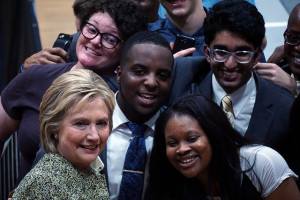
Hillary Clinton with supporters at Hillside High School, Durham, NC.
This is the headline the mainstream media would be running today if they were honest. Last night, Hillary Clinton racked up decisive wins in the delegate-rich Florida, North Carolina and Ohio Democratic Party primaries, as well as narrow wins in Illinois and Missouri. Almost no one expected Clinton to do so well in last night’s primaries, especially in Ohio. Moreover, due to the cold hard math of the Democratic Party’s proportional delegate allocation (i.e., delegates are awarded based on share of the popular vote in each state, rather than winner take all), Clinton netted approximately 100 delegates over Sanders, to increase her overall lead to about 314 delegates, 1139 to 825 (all totals approximate, as different sources sometimes differ slightly and could be updated).
While Clinton has not yet reached the magic number of 2383 (some sources indicate 2382) delegates needed to clinch the nomination, the problem for Sanders is that it’s becoming nearly impossible for him to catch up. While Sanders has won approximately 40 percent of the pledged delegates thus far, going forward, according to Chris Hayes of MSNBC, Sanders would need to win a much bigger 60-70 percent of outstanding delegates at this point to catch Clinton. In contrast, Clinton only needs about 42 percent of remaining delegates, quite a bit less than she’s already been getting, to win the nomination. And every time Clinton either wins a state or loses by just a little, that’s one less state left in the contest, causing Sanders’ necessary margin of victory in the remaining states to climb even higher and Clinton’s threshold to decline even more. Moreover, we’re not even counting the Democratic delegates who are unpledged, so-called “superdelegates,” the overwhelming majority of whom have endorsed Clinton.
After last night’s big victories for Clinton, many of Bernie Sanders’ supporters now seem resigned to his eventual nomination loss. Evidence of this sentiment could be found, for example, in the comments and diaries at the progressive Daily Kos website, where a number of users who favor Sanders talked about a “tough night.” Many of these Sanders supporters, however, encouraged Sanders to stay in the primary race until the Democratic National Convention in July, perhaps so that Sanders could use his clout to gain a prime-time speaking slot, “push Hillary Clinton further to the left,” possibly make party platform demands and otherwise spread his progressive message. We also believe that, if Sanders returns to his U.S. Senate seat next January as a more influential progressive voice, that is a win-win for the Democratic Party and the country.
For Clinton and her supporters, assuming that Sanders and his followers tone down their sometimes nasty personal attacks (a big if), the focus may now shift to defeating likely Republican nominee Donald Trump in the general election. This will eventually require unifying with the Sanders supporters, although that is not likely to happen overnight, as many of them are still in the early stages of grief.
Photo by Nathania Johnson, used under Creative Commons license. http://is.gd/GB90lq


